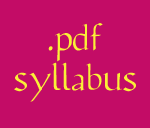

Fall 2006 |
Ruth Feingold MH 52, x2109 rpfeingold@smcm.edu |
 |
 |
Assignments & Responsibilities
Class
participation |
Approx. 25% of final grade |
Quizzes Periodic quizzes—on geography, terminology, chronology—will serve to keep us all on our toes. Short, sweet, practical. |
Approx. 5% of final grade |
| Leadership
presentation & paper In addition to regular class participation, at the beginning of the term you’ll be asked to pick a leader from Indian history in the period we’re studying, and prepare a short class presentation (plan for about 10 minutes) on him or her. A list of leaders—Indian, Pakistani, and British colonial—will be provided for you to choose from, although your own suggestions may be entertained. Mahatma Gandi is out. Too obvious. Ideally, your chosen leader will mesh with the topic the day that you present, and will be useful for our understanding of it; it’s possible, though, that you may be presenting out of sync. On the same day that you deliver your presentation, you will also turn in a 4-page paper (1400 words) on the same figure. |
Approx. 15% of final grade |
Film analysis Pick one film we view during the semester, and write an essay (1750 words) about it.
|
Approx. 10% of final grade |
| Final essay This paper, due at the end of the semester, should be an articulate, intelligent, finely-honed analysis (2800 words, +/- 10%) of one or more of the works or issues we have studied in class—or, with instructor’s permission, of another relevant text/set of texts. This is not something you should start thinking about over Thanksgiving Break—please begin to consider what you might like to write about by midway through the term. I don’t want this to turn into a rote assignment you dash off frantically in order to get a grade; rather, if done properly, it should be a real learning experience that builds on the semester’s reading and discussion. If you’re unsure how to approach the essay (or even if you’re certain, for that matter), come talk to me to let me know what you’re thinking, get suggestions for reading, bounce ideas around. |
Approx. 30% of final grade |
Trip reflection The study tour associated with this class is just that—an opportunity for study of a different kind. Yes, it’ll be fun; yes, you’ll get a chance to eat, and shop—but I also want to see you doing some serious thinking about what you see on the trip, and have you relate it to the rest of the semester’s work. The form this reflection can take is open-ended. You may keep a journal during the trip; or blog; or write one or more formal essays; or do a creative project of some kind (photojournalism, creative writing, sketching). A group project is also a possibility. |
Approx. 15% of final grade |